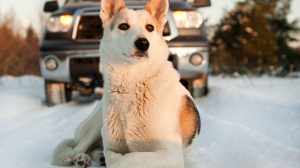Antifreeze Poisoning
What is ethylene glycol?
Ethylene glycol, a sweet-tasting, odorless liquid, is the active ingredient in most automotive antifreeze products. Ethylene glycol can also be found, in lower, less harmful, concentrations, in some windshield de-icing agents, hydraulic brake fluid, motor oils, solvents, paints, film processing solutions, wood stains, inks, printer cartridges, etc.
How do dogs get ethylene glycol poisoning?
Dogs may be attracted to ethylene glycol by its sweet taste. Many animals will voluntarily drink ethylene glycol if antifreeze is spilled or leaks onto garage floors or driveways. Ethylene glycol has a very narrow margin of safety – which means only a tiny amount can result in severe poisoning. As little as half a teaspoon per pound of a dog’s body weight can result in fatality.

What are the signs of ethylene glycol poisoning?
Ethylene glycol poisoning is divided into three stages.
Stage 1: (within 30 minutes of ingestion): The signs include lethargy, vomiting, incoordination, excessive urination, excessive thirst, hypothermia (low body temperature), seizures, and coma.
Stage 2 – 12 to 24 hours after ingestion: Some of the signs seem to dramatically improve, luring pet owners into a false sense of security. However, during this stage, dogs become dehydrated, and develop an elevated breathing and heart rate.
Stage 3 – (36-72 hours after ingestion): At this stage, signs of severe kidney dysfunction, which is characterized by swollen, painful kidneys and the production of minimal to no urine, may occur. Progressive depression, lethargy, lack of appetite, vomiting, seizures, coma, and death may be seen.
What to do if you suspect your Husky has ethylene glycol poisoning?
It is critical that you bring your dog to a veterinary clinic if you know or even suspect that they have consumed ethylene glycol, or if they are exhibiting any of the early symptoms.
Do not wait; time is of the essence and immediate treatment is essential!
Dogs must be treated within 8-12 hours of ingesting antifreeze, as the antidote only has a narrow time period to work. Left untreated, the animal may die.
Prevent Antifreeze Poisoning in Pets
- Take preventive measures to keep your pets from accidental antifreeze poisoning
- Keep antifreeze in sealed containers out of reach of pets.
- Dispose used antifreeze containers and rags in a garbage can pets can’t access or open.
- Routinely check your garage floor and driveway for antifreeze leaks or spills. Cat litter is one way to absorb antifreeze leaks – dispose of it immediately after use, in a bag that can be securely sealed.
- Wash your pet’s paws in warm, soapy water if you suspect they may have exposed to antifreeze while outside.
- Switch to a pet-safe, propylene glycol based antifreeze. Although not 100% nontoxic, it’s considered less toxic than ethylene glycol based antifreezes.